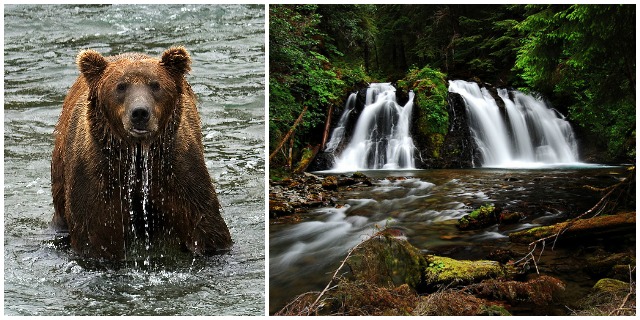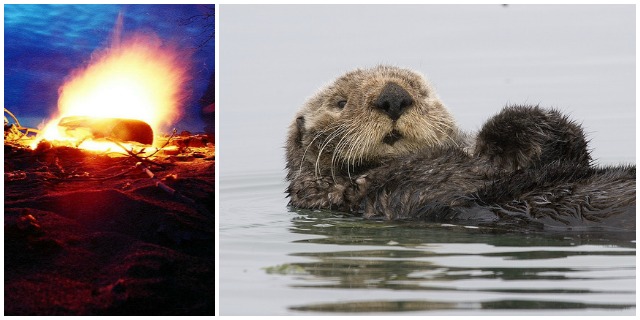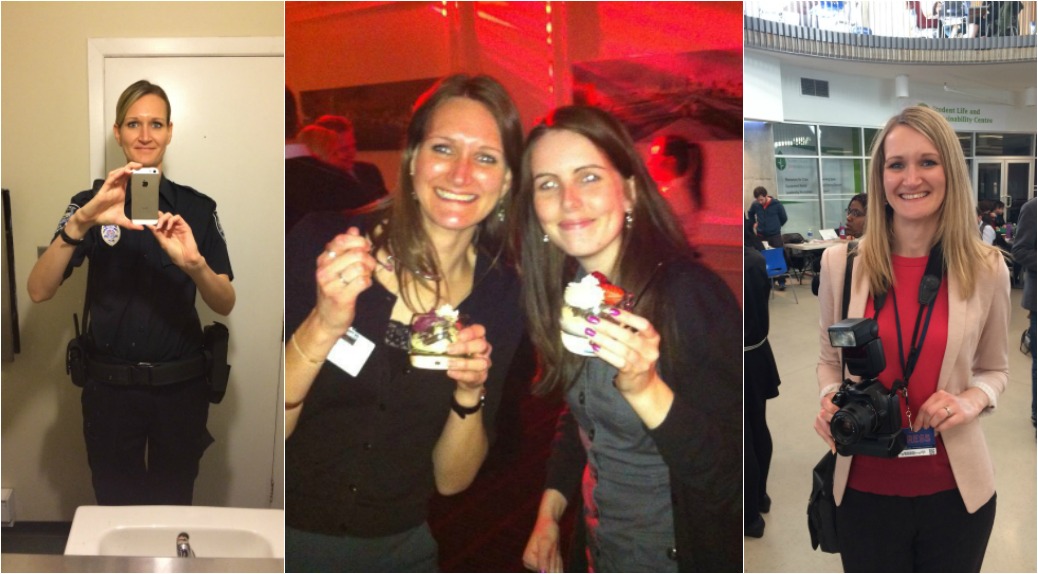Once a month, we’re going to talk about awesome/weird/adventurous jobs that you (maybe) didn’t even know existed and talk to people who have done them. If you’re sick of your current gig, get to applying!
Imagine spending your summer in a place with 18 hours of sunlight, river-jumping salmon and rugged, outdoorsy cuties. Yes please!
Alaska’s booming tourist industry requires thousands of seasonal workers every summer. If you have experience in the hospitality industry (or if you’re willing to get some) you could spend the summer working your ass off, making decent money and having tons of adventures under the (almost) midnight sun.
Most Alaskan employers include room and board in their employment packages, so if you’re careful, you’ll be able to save most of the money you earn. And if you’re earning tips on top of an hourly wage? It can add up to a tidy sum.
Leslie spent a summer cooking at a fly fishing lodge in remote Alaska.
Tell us about your Alaskan experience!
I worked at
Alaska West, a semi-permanent fly fishing lodge in Quinhagak, Alaska along the Kanektok river. You fly in on a bush plane and take a six mile boat ride upriver to camp. It is that isolated. And you will ask yourself, “what have I gotten myself into?”
I was in camp for three months, arriving in early June and leaving at the end of August of 2010. At AKW, I worked in the kitchen, where my fancy title was “Lead Chef Assistant.”
On any given week, we had about 18-25 clients who flew in from all over United States, British Columbia, France, Scotland and South Africa! Clients come up for one week to catch THE freshest, most awesome wild Alaskan salmon (all five species), plus some pretty gnarly rainbow trout, dolly varden and grayling.
How much money did you make over the season?
I made $2,000 per month, plus tips. All the staff equally shared tips, which could sometimes get up as high as $500 per week, per person. Other than any extraneous bills you had looming back in the Continental US, you had no living expenses. There were also opportunities for bonuses and travel compensation.
How did you prepare to work in Alaska?
In addition to the mental part of the experience, I also had to think about the material. You’re living in a tent, you’re going to the bathroom in a port-a-potty (no in-ground plumbing due to the tundra), you’re living in a space that’s about 15’x10.’ And there are bugs. Lots of bugs. Not to mention the fact that you’re in native Alaska.
You’re among a people who have more history than any white girl from Cleveland could possibly have. You have to pack smart. Bring only what you need but also anything you think you MAY need. You’re far from home and common luxuries are hard to come by (such as alcohol since Quinhagak is also a dry village). Oh, and you’re not going to have a day off for three months straight. You have to think of all of this BEFORE you get there, just so you aren’t surprised.
Can you tell us about an average day in the life of an temporary Alaskan?
Every single day, with the exception of Fridays (client change-out day) was identical. I woke up at 5:50 a.m. or whenever the generator was turned on. After washing my face and brushing my teeth in the utility sink, I’d put on my Danskos and head to the kitchen by 6:00 a.m. (about a 50-yard walk to the dining tent).
The kitchen crew (an 80 year-old classically trained, Swiss chef and another guy about my age) were responsible for a hot breakfast and dinner on a daily basis. We also set out lunch fixings for the guides and clients for their 10-hour day on the river. Although we had to get up an hour before most others, we’d get 2-3 hour break in the afternoon after all the dinner prep had be completed. We’d go back to the kitchen by 5:30 pm. Appetizers at 6:30, dinner at 7:30 and usually done for the day by about 8:30. Luckily, dinner dishes were done by the guides so that was also a nice bonus. After dinner, we’d hang out in someone’s tent, laugh, play cards or just go right to bed.
What were the biggest challenges about your experience?
The biggest challenge is being away from friends and family. I couldn’t imagine being there without Matt. To be up there alone, even if the other staff is like family, would be such a huge hurdle. Luckily, there isn’t a lot of time to think about it because if you’re not working, you’re probably asleep.
In addition to being so far away, the internet is spotty and the phones are all satellite so you aren’t really sure if you can even get in touch with the real world. The Groundhog Day-type experience is trying. What you remember, though, is that the 24 other crew members up there are going through the same thing. You learn to buckle down together.
What did you take away from your experience? What were the biggest benefits?
For starters, I was in ALASKA. You hear about it on TV and the whole state is generalized with glaciers, fish and bears. It is SO much more than that. It’s culture (and a very different one at that), it’s mountains, it’s flat, vast tundra.
The biggest thing I took away from it is that I realized I am strong person who can persevere through just about anything. I can handle a challenge. I can “rough it” and barely flinch. Now that I’m back in the continental United States, when things get a little hairy, I say to myself “you lived in a tent in Alaska for three months. This is cake.”
Also, I caught my first fish on a fly, which was really, really awesome.
Who would be a good fit for a season in Alaska?
It takes a very mentally tough person to stay for a season at Alaska West. You can’t get homesick. You can miss your friends and family but you can’t show it. You can’t be squeamish. You have to be okay with living in shared spaces. Bugs cannot make you squeal like a nancy. You have to know how to live simply. Also, you need to surrender to the fact that you’re probably never going to sleep more than seven hours a night – if you’re lucky.
Resources!
Have you ever working in Alaska? What other advice would you give?
















Oh my goodness (hi, new to your blog as of last night! :), this sounds just incredible. Alaska is one of the few states I have yet to visit. It's just so alluring. The sense of removal from everything is both exciting and scary at once. I have had some short work experiences where I was cut off from the outside world (rural Germany and Hawaii), but I've always wanted to make a bigger commitment like this one! Thanks for your story, Leslie!
FANTASTIC series theme. Will be devouring these every time they're posted!
AGREED – I've been looking for something like this forever!!!
This sounds so awesome. One of my favorite places I've been yet was Alaska. The first time I went kayaking was on an Alaskan glacial lake with my cousin. Talk about pristine and wild. Little seals would pop their heads up next to our kayak, and the area was full of bald eagles. Just amazing.
Sarah M
My boyfriend does this same job, too, but in at a different lodge in a different part of Alaska. He leaves next week for 4 months. He LOVES it!
(as a fishing guide)
What she said about not getting homesick and packing light. Like she said getting in touch with the rest of the world is tricky, often you'll have to manage on your own. Many times have I seen someone struggle with an oversized duffle. 3 months can be managed out of a 60 liter pack if well thought out. You will wear the same outfits every week, but you will get used to it. You will be happy to have less weight to carry around and to skip the extra time you used to waste playing "what do I wear today?"
I am an observer on commercial fishing boats in Alaska so my Alaskan experience is a bit different from Leslie's. I'm constantly on the move and work with some real characters. I might not run into a coworker (another observer) for weeks so most of my human interaction is with fisherman. It's definitely an interesting adventure but it isn't for everyone. But I wholeheartedly advise you to visit Alaska sometime. It's a beautiful place
I love Alaska! I have worked several seasons as a Quality Control technician in salmon processing plants and I have seen some crazy things and have amassed bragging rights to last me the rest of my life.
Anytime my regular job gets rough I just think "dude, you worked 110-hour weeks fighting with machinists, you can handle this."
It would be tedious and exhausting for days and then something crazy would happen that would make it worthwhile, like I would take my coffee break outside and see an orca swim by. My job could be hell, but the times I could get away from work were magic. Also, I met my husband there!
One thing that I could never get used to was the insane amount of male attention I would get as one of only a few women around (in one plant we were outnumbered 6 to 200-ish.) It would range from flattering to threatening and did require a good deal of mental toughness to navigate.